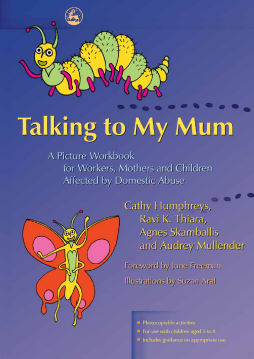
Additional Information
Book Details
Abstract
Talking to My Mum is an activity pack for five-eight-year-olds whose families have experienced domestic abuse to help and encourage them to open up to their mothers about their distressing experiences.
Based on the authors' work with families who have experienced domestic abuse, the book is full of illustrated worksheets featuring animal characters who encourage the young reader to explore a range of memories, such as changes in the family's living arrangements or happy memories with siblings or favourite toys that each prompt a particular emotion. These activities are accompanied by guidance on how to use them appropriately. Talking to My Mum is designed for children and their mothers to complete together, and will assist both child and mother with improving communication about the past, present and future.
This activity pack will be an essential tool for families with children who have lived through domestic abuse, as well as social workers and other professionals working with them.
This a great book for mothers and children who have experienced domestic violence. It is very practical and explains each activity to the adult with lovely illustrations and offers activities for the child to work through. It could be used by a clinician (or other worker) with the child, but it is perhaps best used by a mother with her own child.
youthmind.co.uk
Cathy Humphreys, Ravi K Thiara, Agnes Skamballis and Audrey Mullender form the research team for the Centre for the Study of Safety and Wellbeing, at the University of Warwick. Cathy Humphreys is a Senior Lecturer in the School of Health and Social Studies at the University of Warwick. Ravi K Thiara is Senior Research Fellow in the School of Health and Social Studies at the University of Warwick. Audrey Mullender is Principal of Ruskin College, Oxford University. Her distinguished research career has focused on domestic violence, post-adoption issues for birth relatives and groupwork theory.
Talking to my mum, the companion voulune to Talking about Domestic Abuse, is a well-organised, easy-to-read activity workbook providing another excellent resource, this time for working with children aged between five and eight years old, who have experienced domestic abuse within their families. With the use of current research, the authors have shown great understanding and sensitivity in identifying issues that contribute to the difficulties women and children face when living within or leaving an abusive relationship. The workbook activities, with their excellently illustrated woodland characters, have been developed to attract and draw on the imagination of young children. Each activity introduces characters as a way for mothers and children to talk symbolically about positive and negative memories, changes that have happened in their lives, to identify and express feelings and move feeling and move forward on their journey to anew life. All the activities offer the opportunity for mothers and children to spend quality time together. Families can rebuild positive relationships in a safe, creative and fun way. This can only be helpful to the child's future development and self-esteem, and also to the mother's belief in herself as a parent. Both books would be essential tools for practitioners working with children and young people whose families have experienced domestic abuse. They are clearly written and illustrated in an engaging style that grasps the reader's attention. They also deepen an understanding of how and why a creative approach with children can work in the healing process.
Counselling Children and Young People
This picture workbook contains activities for five- to eight-year-olds who have been affected by domestic abuse, to help them recover and move on. Designed for children and their mothers to complete together, the book includes guidance for mothers on how to do this in a sensitive manner. The activities, which have been developed by the authors, are based on their own work with families who have experienced domestic abuse.
Children Now
